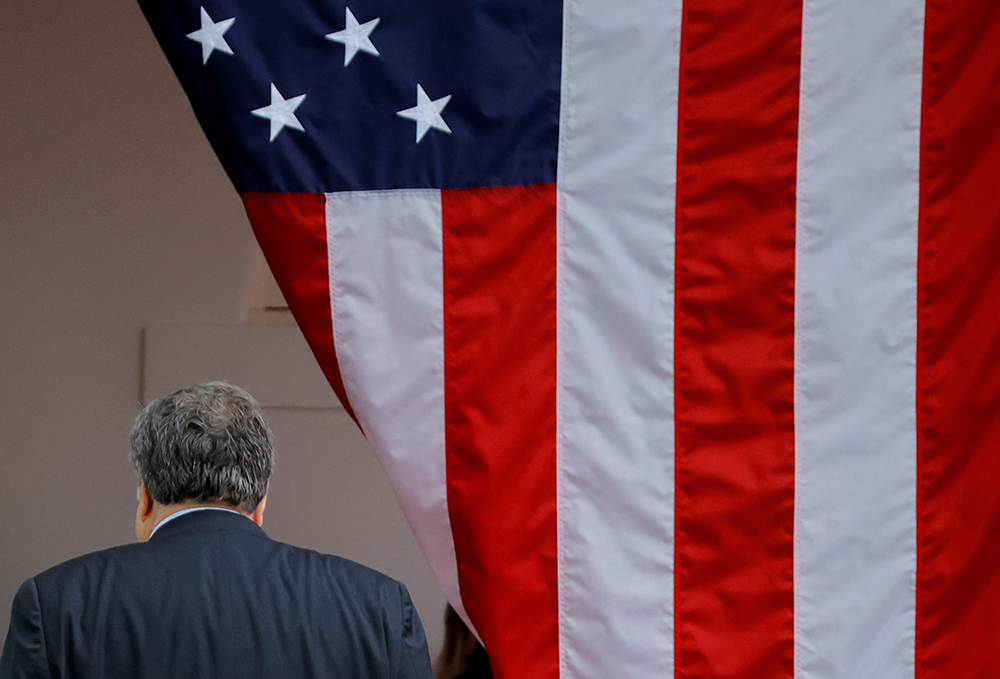
Attorney General William Barr is seen at the White House Sept. 26. Earlier that week, Barr, a Catholic, oversaw the federal executions of William Emmett LeCroy and Christopher Andre Vialva. (CNS/Reuters/Carlos Barria)
Until July 14, not one man or woman on the federal government's death row had been put to death in the last 17 years. In fact, until then, for the past 50 years, only three people had been executed by the federal government.
Yet in a three-month killing spree that conspicuously began during the heated final months of the 2020 presidential campaign, Attorney General William Barr oversaw the executions of seven people: Daniel Lewis Lee on July 14; two days later, Wesley Ira Purkey; the next day Dustin Lee Honken.
A little over a month passed, then the executions resumed. On Aug. 26, the federal government executed Lezmond Mitchell, the only Native American on federal death row. His own people — the Navajo — vehemently opposed his death.
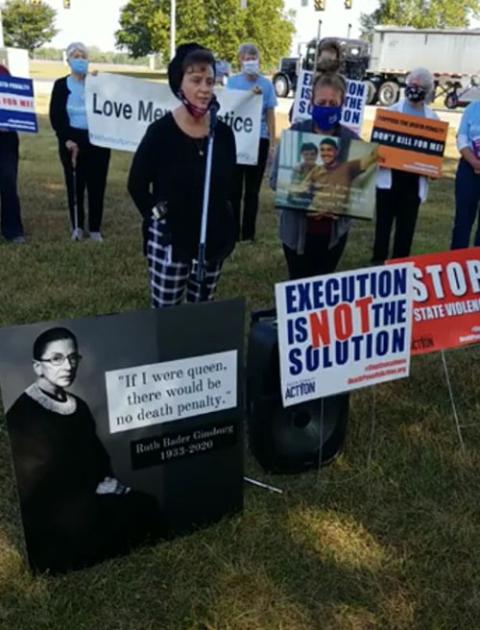
Lisa Brown, the mother of Christopher Vialva, speaks during a Sept. 24 news conference near the Federal Correctional Complex in Terre Haute, Indiana. Her son was executed less than eight hours later that day. (CNS/Criterion screenshot from Facebook livestream)
The executions continued with Keith Dwayne Nelson on Aug. 28, William Emmett LeCroy on Sept. 22, and Christopher Andre Vialva two days later.
In between their deaths, the attorney general, a Catholic, received the Christifideles Laici Award, to "help highlight these good works and those who serve the Church so well" at the National Catholic Prayer Breakfast.
On Nov. 3, Joseph Biden, who has pledged to eliminate the federal death penalty and to offer incentives to the states to end theirs as well, was elected president.
Despite the fact that there have been no lame-duck federal executions since 1889, when Grover Cleveland presided over the execution of a Choctaw Indian, this administration will kill six human beings. Evidently, these executions have been accelerated, now scheduled to occur before the Biden inauguration on Jan. 20.
On Nov. 19, Barr oversaw the execution of Orlando Hall. On Dec. 10, Brandon Bernard was executed, with the execution of Alfred Bourgeois scheduled for the next day. On Jan. 12, the only woman on federal death row, Lisa Montgomery, will be killed. (No woman has been executed by the federal government in more than 60 years.) The executions will continue on Jan. 14 with Cory Johnson and on the following day with Dustin Higgs.
Of the six, one is a white woman and five are black men.
Study after study demonstrates that the death penalty is infected with racial bias; the federal death penalty is no different. Indeed, in 1994, a mere six years after the implementation of the "modern" federal death penalty, the racial disparities compelled a congressional committee to conclude, "On the federal level, cases selected have almost exclusively involved minority defendants."
We are witnessing this Advent a modern-day lynching.
Each of the defendants in these cases was involved in crimes that resulted in the deaths of others. Some of the crimes were gruesome. But who these people are warrant a closer look.
Bernard was a teenager when he was an accomplice to the murder of a young couple, both youth ministers, on the Fort Hood military reservation in Texas. He did not fire the killing shots — a co-defendant, also sentenced to death and subsequently executed — did.
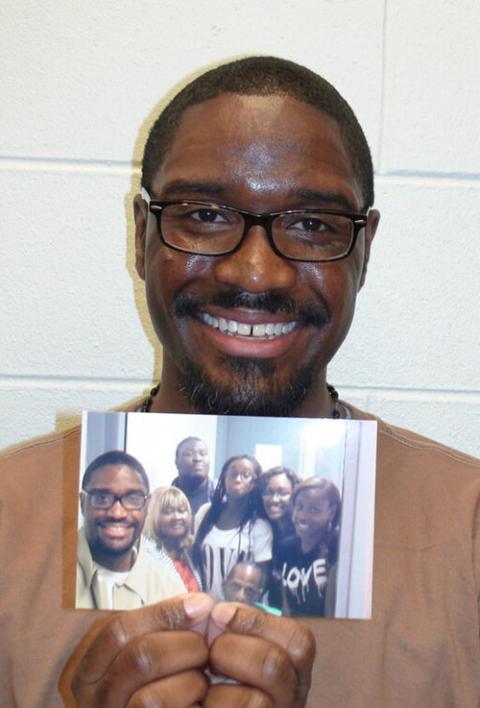
Brandon Bernard shows a photo of a prison visit with his family. (Brandon Bernard’s Defense Team)
Bernard, a young black man, was tried in Texas before a jury in which all but one juror was white. His attorneys did not even make an opening statement at his trial and during the penalty phase — where the jury chooses between life and death — the same attorneys offered no witnesses on his behalf.
One of the federal prosecutors who earlier secured Bernard's death sentence later sought to have his life spared. Angela Moore writes that her subsequent "experience with teenagers who have committed violent crimes, especially boys of color, has taught me much about the recklessness and fragility of adolescents, as well as their ability to mature and change."
She also finds "another troubling fact revealed by recent research is that people tend to view Black boys — like Brandon — as more blameworthy than their white counterparts" and that "Black teens like Brandon are systematically denied the 'benefit' of their youth, which is outweighed by their race in the eyes of police, prosecutors, judges and jurors."
Originally, she was one of those who denied recognition of Bernard's status as a teenager. In the two decades that Bernard spent on death row, he devoted his life to helping at-risk teenagers. Not one time was he ever disciplined for a violation of prison rules.
The litany of harm and pain inflicted on Montgomery's tragic life is difficult to detail because, at some point, it becomes simply overwhelming. At the tender age of 4, she witnessed one of the many men in her mother's life raping her older sister. In an attempt to console each other while the assault was occurring, Lisa and her sister would "reach for each other and touch fingers." Montgomery's older sister escaped; she was placed in foster care. But Lisa would remain in the "care" of her mother. At 11, her stepfather started raping her every night, threatening to rape her younger sister if she refused. The picture here, publicly available, is Montgomery at the age when her stepfather began to sexually assault her.

Lisa Montgomery, at the age when her stepfather began raping her (Cornell Center on the Death Penalty Worldwide)
Montgomery was born with brain damage from her mother's drinking; the mother brutally beat all her children and began prostituting Montgomery in her early teens. At times, Montgomery was raped by several men, one after the other, for hours on end. As a consequence of years of sexual torture, she began to disassociate from reality and developed post-traumatic stress disorder. Her school noticed that when she did come to class, she was filthy and dressed in ripped and tattered clothing. Montgomery told people what was happening to her, including a cousin who was a deputy sheriff, but no one intervened.
Her mother married Montgomery off to her stepbrother, who abused and raped her. She gave birth to four children and then was involuntarily sterilized.
Her mental health collapses. She behaves erratically. Her now ex-husband tries to take custody of two of the children; Montgomery lies and says that she is pregnant — a lie her ex-husband threatens to use in court to enhance his prospects to take the children. At this point, Lisa Montgomery — mentally ill, traumatized, and brain-damaged — commits an awful offense: She kills an eight-month pregnant woman, cuts the woman's unborn baby from her womb, and takes the baby home, caring for it and pretending that it is her own child.
Her older sister is now publicly begging for her sister's life. She has said that Lisa "needs someone for once in her life to be on her side."
Johnson is scheduled to be killed less than a week before the Trump/Barr administration ends. Abandoned by his mother at 13 because of his intellectual disabilities, Johnson was then placed in a facility for children with intellectual and emotional impairments. When he left the facility years later, at age 18, he had no skills, no family, no support and no structure. He was absorbed into a gang and became involved in a series of drug-related shootings.
But unlike any other person on the federal government's death row, and "despite compelling evidence demonstrating his intellectual disability, no jury or court has ever listened to the evidence at a hearing to decide if he has intellectual disability," according to a statement from his attorneys.
Advertisement
Because the federal government had not executed anyone in 17 years, claims were brought on behalf of the first prisoner, Lee, that the federal government's lethal-injection protocol violates the Eighth Amendment's ban on cruel and unusual punishment. After a stay by a district court, the federal government filed emergency appeals that eventually went to the U.S. Supreme Court. At 2 a.m., on the morning of July 14, the Supreme Court — in a 5-4 vote — dissolved the stay. There would be no consideration of "novel and difficult constitutional questions." There would be no "benefit of further factual and legal development." Lee was pronounced dead at 8:07 a.m.
The court order vacating the stay was unsigned, but there were four named dissenters: Justices Sonia Sotomayor (a Catholic), Stephen Breyer, Elena Kagan and Ruth Bader Ginsburg. The five who cooperated in the government's rush to death were the remaining four Catholic justices (Chief Justice John Roberts and Justices Clarence Thomas, Samuel Alito and Brett Kavanaugh) and Justice Neil Gorsuch.
This became the template moving forward. The lower courts voted to stop Purkey's execution; the Supreme Court intervened and vacated those stays and he was killed. The lower courts entered stays to Honken's execution; the Supreme Court intervened and vacated those stays and he was killed. The lower courts stopped Nelson's execution; the Supreme Court vacated those stays and he was killed.
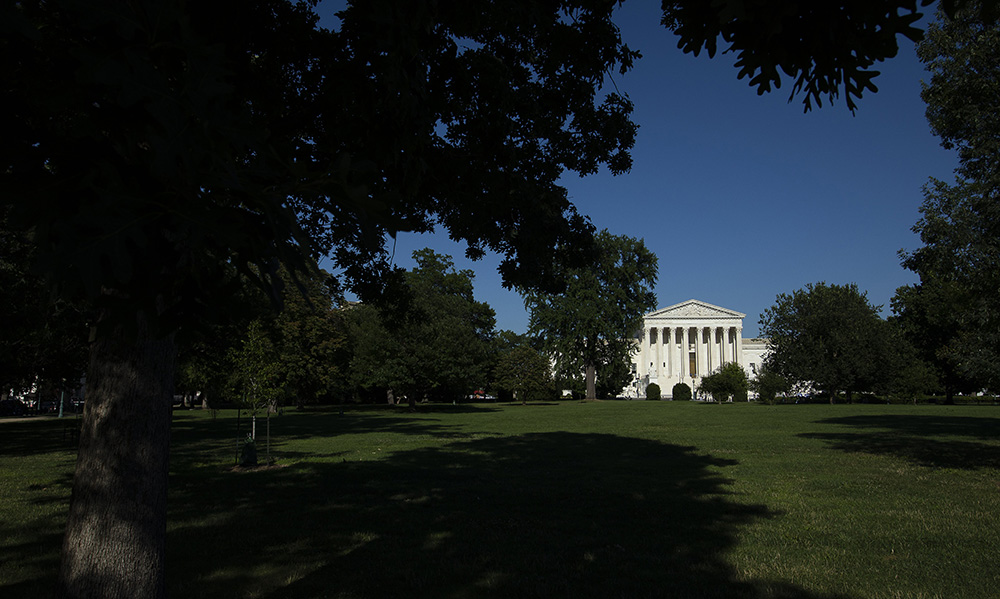
The U.S. Supreme Court in Washington, D.C. (CNS/Tyler Orsburn)
As legal scholar Ngozi Ndulue noted:
In the days and hours before the first federal executions in mid-July 2020, the court issued cursory unsigned 5-4 orders reversing several district court injunctions that had been left in place by the federal courts of appeal and denying defense applications for stays of execution to permit case-related appeals to go forward. Disregarding traditional appellate rules of requiring evidentiary hearings to resolve disputed issues of material fact and then deferring to fact findings of the trial court that are supported by the record, the Court ruled against the death-row prisoner in every case.
The lessons have been learned by the lower courts. They are less likely to issue stays, believing that there is "no amount of new evidence," as one district court put it, that could convince the justices that the executions are unconstitutional.
Of course, not all lower courts learn their lessons with equal alacrity. Hall was executed on Nov. 19. Before his scheduled execution, the federal district court entered a stay. Ginsburg was no longer on the court; her replacement, Justice Amy Coney Barrett, had just been sworn in. Now the Supreme Court did not even wait for the United States Court of Appeals to weigh in — it reached down and vacated the stay. Barrett joined her fellow Catholic justices and Gorsuch. Hall was killed one hour later.
Thankfully, our bishops have protested the present killing spree on four occasions: on July 14, on Sept. 22, on Nov. 18 and on Dec. 7. Moreover, unequivocally the church teaches in the catechism "in the light of the Gospel, that 'the death penalty is inadmissible because it is an attack on the inviolability and dignity of the person' and she works with determination for its abolition worldwide."
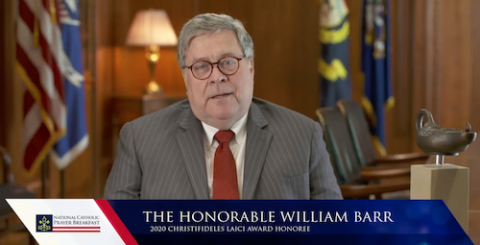
Attorney General William Barr addresses the National Catholic Prayer Breakfast, held virtually Sept. 23, where he received the "Christifideles Laici" award for service to the church. (NCR screenshot)
Still, Catholics are assiduously ignoring these teachings. Barr launched the killing spree without hesitation, and when the Catholic justices intervened and vacated preemptively the stays of execution, they effected these killings. The active Catholic participation in this killing spree is remarkable, and of course, scandalous, especially in as much as they rush the nation to committing these actual executions.
Moreover, when the National Catholic Prayer Breakfast presented the attorney general its award, it senselessly validated all of this.
These matters we must recognize.
We must also recognize this killing spree as another moment of unparalleled violence in America, indeed a historically anomalous moment.
That in this spree, Black Lives Matter is grossly denied.
That knowing Brandon Bernard, Lisa Montgomery and Cory Johnson ought to matter.
That the merciless brutality of the federal executions significantly matches the merciless brutality of the murders themselves.
And that Catholics in high offices have shown by their own extraordinary actions that they are among the most active participants in executing tragically vulnerable people.
Advent is the time of preparation for the in-breaking of God's kingdom, heralded by those who bring peace. As we recognize this killing spree, let us commit ourselves to make our country and our church in this country less a household of violence and more a kingdom of peace. Indeed, there is more work to be done than we may realize.
[Jesuit Fr. James F. Keenan is Canisius Professor at Boston College, where he is vice provost for global engagement and director of the Jesuit Institute. William R. Montross Jr. has been a capital-defense attorney for 17 years, formerly with the Southern Center for Human Rights and currently with the Military Commission Defense Organization.]








